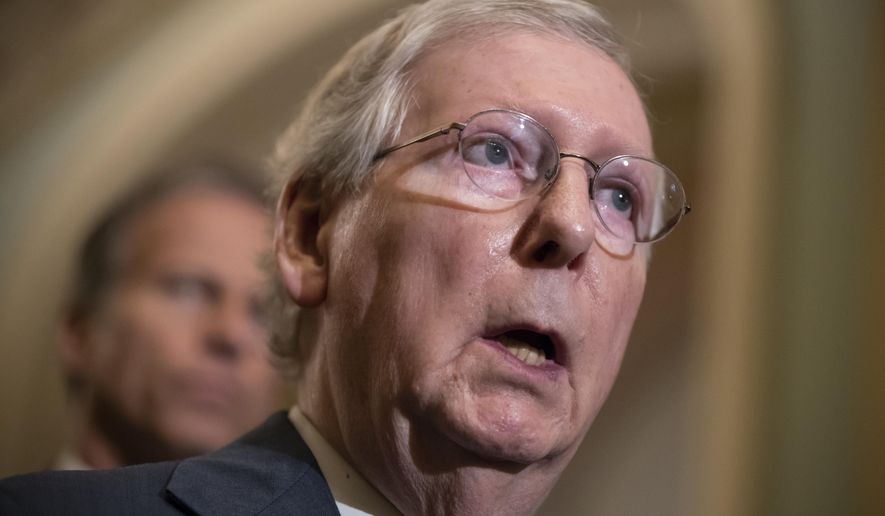Senate Republican leaders have concluded that they will have to spend more time in the Washington swamp — in August, no less — if they want to make headway on draining it.
Majority Leader Mitch McConnell said Tuesday that he is canceling the chamber’s summer vacation and will keep lawmakers in town for most of August, forcing them to take more votes to approve President Trump’s judicial nominees and make headway on the annual slate of spending bills.
The move is as symbolic as it is substantive, signaling that Republicans hope to avoid getting tagged as leaders of a do-nothing Congress before voters head to polls.
Staying in town will give them extra time to work on a farm bill, the annual defense policy bill, water projects legislation and more opioids measures, as well as the ongoing efforts to approve nominees and pass bills to keep the government open into the new fiscal year.
Mr. McConnell, Kentucky Republican, portrayed the slimmed-down vacation as an insurance policy.
“Even with cooperation, we’ve got a lot of appropriation bills to pass, we’ve got this backlog of nominations,” Mr. McConnell said. “Certainly we anticipate and hope to have less obstruction on those, but I’ve been hoping for that for quite some time and it hasn’t occurred yet.”
His schedule will give senators a weeklong vacation in early August, but they will have to be back in Washington for the final three weeks, instead of on vacations or official fact-finding junkets or campaigning back home.
President Trump had called for the move — though Democrats said it will put pressure on him to cancel his own August vacation and share the workload.
Lawmakers in both parties generally cheered the move, though they were not sold on whether it would produce results.
“It is important to remember that simply canceling the August state work period is not the goal,” said Sen. David Perdue, a Georgia Republican who pushed for the scheduling change. “We should be working nights and weekends now to get the results the American people sent us here to deliver.”
Senate Democrats said they hope Mr. McConnell will add health care to his August agenda. They said Obamacare premiums are rising to accommodate the repeal of the individual mandate and continued uncertainty about the health care markets.
“We welcome the opportunity to address it, and we’re going to work very hard in August to require our Republican colleagues to do something about it,” said Senate Minority Leader Charles E. Schumer, New York Democrat.
Not on the Senate’s to-do list was passing a budget — Congress is already nearly two months overdue on that deadline. Nor was tackling immigration.
Instead, the big issues to tackle will likely be a backlog of presidential nominees and the annual spending bills.
Sen. Richard C. Shelby, an Alabama Republican who chairs the Appropriations Committee, said the additional time provides no guarantee that lawmakers can pass all 12 bills required to fund the government before the next shutdown deadline hits on Sept. 30.
But he said more time “gives us a better chance.”
Other appropriators, though, have signaled that they expect to resort to a stopgap bill to get past the Sept. 30 deadline.
House conservatives, who frequently complain about the comparatively slow pace of the Senate, praised Mr. McConnell’s move.
“I’ve been saying since last July that Congress should have more working days in order to get the priorities that we promised the American people across the finish line. It’s good to see the Senate adding days to their calendar,” Rep. Ted Budd, North Carolina Republican, said on Twitter.
Mr. McConnell shortened last year’s summer vacation as well. He originally announced that lawmakers would lose two weeks of their break as he tried to push for votes on an Obamacare repeal and action on spending bills and nominations.
But after the Obamacare repeal sputtered, Republicans gave up and rushed for the exits after only a week of extra work.
This year, sticking around Washington has added implications. With elections looming in November, being at the Capitol means less time for senators in tough races to campaign back home.
Sen. Cory Gardner of Colorado, who heads the Senate Republican campaign arm, said that won’t hurt lawmakers if they use the additional time to do more work.
“The benefit of August is getting our work done for the American people, and that will have a benefit in November,” he said.
But liberal activists said the move showed desperation of Republicans who are afraid to face voters.
“Voters know they’re getting screwed by this Congress, and McConnell doesn’t want the PR nightmare of dozens of negative town halls in August,” the group Patriotic Millionaires said in a statement.
Lawmakers facing tough re-elections, though, said they are eager to show what they can accomplish in extra time.
“I just hope that this is not posturing,” said Sen. Claire McCaskill, Missouri Democrat. “I hope that Sen. McConnell is serious about the No. 1 issue in my state, which is doing something about health care costs.”
Sen. Dean Heller, a Nevada Republican who pushed to cancel the recess, cheered the move but said even more time may be needed.
“As I have said time and time again, Congress needs to do its job, and if that means that we need to remain on the floor of the U.S. Senate on the weekends, overnight and through the month of August to make more progress, then we should do it,” he said.
• David Sherfinski can be reached at dsherfinski@washingtontimes.com.




Please read our comment policy before commenting.